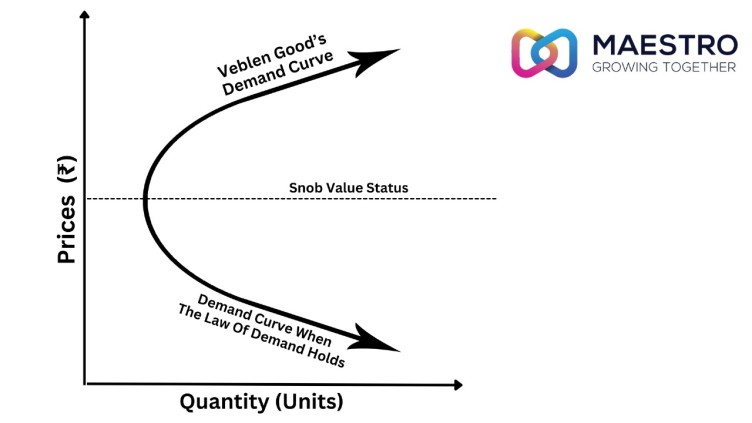11 Nov The Veblen Effect- Unlock the Cheat Code of Marketing & Position Your Properties
You must have heard of the Veblen effect and seen it play out in today’s world. However, not many people are aware of where or how it came about. That’s about to change as we’re about to take you down history lane. It goes all the way back to the 1st century BC, the era of Julius Caesar.
The Origin of the Veblen Effect
In his early twenties, Julius Caesar was a promising politician blessed with intelligence and confidence. On his journey across the Aegean Sea, he was kidnapped by Sicilian Pirates who demanded 20 talents of silver (worth $600k in today’s time).
Caesar suggested that such a sum was too low for a man of his calibre. He insisted they increase the ransom demand to 50 talents of silver (worth about $1.5 million today). This puzzled the pirates, but who would say no to more money? So they released his men, who returned to Rome to find the ransom. Back in Rome, the story of Caesar grew in prominence because of the size of his ransom.
This bold move gave people the impression that he was very important. Consequently, Caesar became a political force. This is the story of how the ‘Veblen Effect’ came into existence, although it wasn’t named as such until a couple of millennia later. It was named after Thorstein Veblen.
The Concept of the Veblen Effect
The Veblen Effect is an interesting psychological strategy, and it has been used to one’s advantage for a very long time. It simply means making the consumers or target market think that goods or services with higher prices are of greater value and higher quality than they actually possess. In summary, it utilises cost-influenced value. It’s a strategy that has withstood the test of time.
Look at brands such as Rolls Royce, Rolex, Apple, Louis Vuitton, Christian Louboutin, etc. They manufacture expensive products that may or may not be more functional than lower-priced alternatives. Still, the high price tag gives the impression that their quality is higher, making them more desirable and sought after by the public attaching pride and prestige of possessing them.
This was exactly what Julius Caesar did, and it paid off. His astronomical self-valuation made him an instant celebrity in Rome, and his men wasted no time in raising the money.
There’s a valuable lesson to pick from here – understand how people think and use it to your advantage. The Veblen effect is a mind game that has interesting applications in different fields of life and business, including real estate. To sum up, when the Veblen effect is applied, it controls the context, the mind, and one’s reality.

How to use The Veblen Effect to Market Real Estate Projects?
Real Estate Developers may use the Veblen effect to market their properties and make significant profits effectively. Few of the strategy that will make your target market willingly spend more than they should on a deal and not feel robbed. However, there’s a specific target market that you need to pay attention to – the rich folks who love luxury, status, and exclusivity. Here’s how you can use the Veblen effect to appeal to these consumers.
- Focus on the selling points: When advertising a property for sale or lease, you may get customers attention on the most unique and lavish features. If a home is situated in a high-brow neighborhood, they latch on to that. If it has been previously occupied by a popular figure, you use that. Highlight the luxurious amenities in the home, whether it’s a Jacuzzi, masterful architectural design, etc. You may even go using visually appealing promotional materials such as videos, property tours, or brochures with pictorial descriptions of these features. The purpose of the ad is to create a sense of elitism, scarcity, and luxury.
- Jack up the prices: Houses of higher prices are generally perceived as more desirable or of more quality. That’s the way the human mind works. “If the property costs this much, then it must be a worthy acquisition.” Purchasing such houses gives these consumers some sort of bragging right or an opportunity to impress their friends. Also, it can be a way to keep up a particular lifestyle they fancy.
- Emphasizing the short-term nature of the listing: In other words, this is called limited availability. When Developers will launch projects in the market, create a sense of urgency by making potential buyers think that they may miss out on the deal if they don’t make a move fast. Make them hear things like “few units left” or “offer ends in 3 days.”
- High-End Branding: Real Estate Developers may position their properties to be closely affiliated with luxury brands, the desirability and prestige of those companies will rub off on the real estate portfolio and make it more appealing to the target market.
- Creating Site Experience: Create a Site Experience which has proven to be an extremely powerful and effective method to increase sales and also has rub-off effect on ego of the affluent class customers.
Takeaway
To summarize, the Veblen effect is a marketing cheat code. From the stories of the luxury brands we mentioned earlier, it’s apparent that a higher price equates to a perception of higher value. Real Estate Developers can take a lesson or two from here and strategically position their properties as the most desirable in the market, regardless of the asking price.

